Peter MALONE
Saturday, 18 September 2021 20:01
Cosmopolis
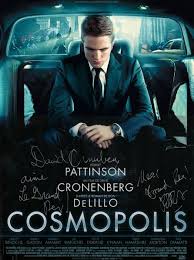
COSMOPOLIS
Canada, 2012, 109 minutes, Colour.
Robert Pattinson, Juliette Binoche, Sarah Gadon, Mathieu Amalric, Jay Baruchel, Kevin Durand, K' Naan, Emily Hampshire, Samantha Morton, Paul Giamatti.
Directed by David Cronenberg.
It requires an initial commitment to stay to watch Cosmopolis, otherwise audiences might be making for the exit quick smart. The commitment is to David Cronenberg and his career and a film of talk and ideas rather than images and action.
Cronenberg has adapted a novel by Don de Lillo. The screenplay is wordy, often poetically wordy, often philosophically or existentially wordy. It often plays more like radio than cinema.
Cosmopolis is a big American city, a financial centre, a city the American president is visiting, a city of protest (which is where the main action sequences are found), a city of enterprise as well as resentment and violence.
For a great deal of the film, the existential tycoon hero is seated in his stretch limousine where underlings communicate with him, where he has a liaison (with Juliette Binoche), where he drives to have a haircut (in fact, only half) and then to answer a mysterious call from a man who wants to shoot him.
Some of the success of the film (or not) depends on response to Robert Pattinson in the central role. In the Twilight series, Pattinson is more of a passive presence and this is the case here. An enigma. He does initiate communication but his manner is more passive than active. Perhaps he is ultimately more of a victim than a hero, but when he comes alive in the final twenty minutes, dramatically playing off Paul Giamatti who makes a powerful impression as the disturbed and disgruntled gunman, he is more impressive.
While there are the action sequences, reminiscent of so many political protests, the action is more a succession of episodes where the mysterious millionaire who manipulates markets and currencies receives a succession of characters from bodyguard to chauffeur, from financial whizkids to women friends (though he does get out of the limousine to go to a diner with a woman friend).
The screenplay has a lot to say about our world, corporations, power and manipulation as well as existential topics of identity and meaning. One can read de Lillo and pause and reflect. Cosmopolis doesn’t always afford that kind of space which means leaving the cinema more puzzled than satisfied.
1. David Cronenberg and his career, audience expectations, themes, philosophy? The visuals?
2. The novel of Don De Lillo, the popular novel, filmable or not? A verbal novel – and the transition to monologues and dialogues on screen?
3. The anonymous city, the title? Universal? Exotic? As seen from the limousine? The presidential visit, terror and fears? The ordinary life in the streets, life in the limousine? The demonstrations? Benno Levin’s house? The musical score?
4. The use of the limousine, the range of equipment, the advice on financial matters, sexual encounters, business deals?
5. Robert Pattinson as Eric? His age, career, success, family, wealth, business acumen? A passive personality? Active? Enigma? The blend of the callow and the deep? The flip and the serious? His being in the limousine? Marriage and money? His aims, the market? Market theories? His paranoia and the questions? Control or destruction? The haircut issue? His discussions with Shiner in the back of the car? Financial theories? The further discussions with Michael? Seeing Elise, getting out of the car, the breakfast, the sexual relationship, the talk, the office? Didi and her coming into the car, the sexual encounter, the discussions? His relationship with his security guard? The discussions with Vija, her advice, financial theories? Going for the haircut, the barber and the talk, the message, his leaving with the haircut half done? His being driven by the chauffeur, the discussions, puzzling where the limousines were held overnight?
6. How well delineated were the characters, just seen in their encounters with Eric: Didi, the guard, Shiner, Michael, Vija? The chauffeur? The barber?
7. The issue of the gun, buying the gun? The message, going to the apartment, finding Levin?
8. Levin, the messy apartment, the toilet, the gun, the shooting? Levin in himself, aged forty-one, the talk, his reflections, his intentions? The shooting? The final questions?
9. The images, the radio? The visuals of the apartment?
10. The demonstrations in the city, the reasons, the presidential visit, the visuals, the crowds, the young, Eric and his reactions?
11. The revelations about Eric? Levin and the issue of the yuan, discussions about patterns of finance?
12. The existential nature of the film, the dialogue, the philosophising? Purpose, life, identity, being known or not, appreciated? Futility?
13. The verbal nature of the film? How cinematic? Audience attention, capacity for reflection?
Published in Movie Reviews
Published in
Movie Reviews
Tagged under
Saturday, 18 September 2021 20:01
Campaign, The
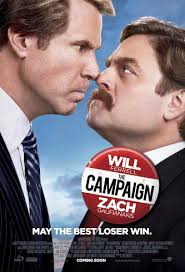
THE CAMPAIGN
US, 2012, 85 minutes, Colour.
Will Ferrell, Zach Galifianakis, Jason Sudeikis, Dylan Mc Dermott, John Lithgow, Dan Aykroyd, Brian Cox.
Directed by Jay Roach.
2012, US election year and incessant, minder-controlled, media-driven, down and dirty campaigning. So, why not a topical comedy, hit and miss variety, funny and serious, a cross between the humour of skits on Saturday Night Live and the humour of movies like The Hangover?
Director Jay Roach is best known for the Austin Power spoofs as well as the Meet The Fockers series. But, in recent years, he has directed two significant HBO films on American politics, Recount (on the Bush- Gore confusion in Florida, 2000) and Game Change, a forceful look at the choice of Sarah Palin as John Mc Cain’s running partner and the campaign of 2008. He is obviously on the wavelength. This is a spoof, parody (with some serious criticisms, especially of billionaire manipulators of trade and industry and unlimited profits). There was a similar kind of film with Kevin Costner,
This is a Will Ferrell comedy. Ferrell never minds appearing as a fool or a slob, or both. He gets the chance here, as a North Carolina congressman, nominating for his district unopposed. He is a sleaze. Two brothers with more money than patriotism, John Lithgow and Dan Aykroyd relishing their roles, decide that they need a stooge to buy up land, sell it to China and then build local sweatships to avoid transport. They choose the dumbest candidate, Marty Huggins, played by Zach Galifiniakis. Galifiniakis can be very funny or obnoxiously unfunny. This time he is very good. His is a role that might have starred Jack Black, and it looks as though Galifiniakis has seen Black’s excellent performance in Bernie and taken over some of the mannerisms and body language.
The campaign is rough as Brady wants to win at all costs (and produces foul TV ads and behaves accordingly). However, his manager, Jason Sudeikis (who can be crass as in Horrible Bosses but is decency in this one) can’t support him. Meanwhile, sinister Dermot Mulroney controls Marty, making him play the dirty game. But, of course, Marty, we know, will rebel, and there will be an honorable ending (even more than anticipated).
Yes, a lot of the film is quite vulgar. But, a lot of it is very funny (especially a Chinese housekeeper whose boss wants her to speak like an old Southern mammy to remember the past, and who has the final word, in Latino accent). There is a guest appearance by the dog from The Artist, one of many throwaway funny bits – with a literal punchline. Political bias? The Republican candidate is nicer than the Democrat! Funny while forgettable.
1. A spoof of American election campaigns? The background of satire and Saturday Night Live? The tongue-in-cheek tone? The crass humour? The overall effect?
2. Released in the context of the 2012 election, the style of the campaigns, regulations – and beyond?
3. The picture of Democrats and Republicans? Variety of stances? Right and left? Corporations?
4. The comic styles of Will Ferrell and Zach Galifianakis? Of the supporting cast? The cameos?
5. The introduction, Cam Brady, Mitch and his being the campaign manager? Cam’s wife, son? In himself, many terms in office? His relationships with people? Values, external? Private immorality? His speeches, the platitudes about God and religion? His sexual attitudes, the campaigner and his relationship? His wife and her attitudes? His presumption of success? The meetings, the papers, submitting for nomination?
6. The Motch brothers, John Lithgow and Dan Aykroyd, satirising big business and corporations? The personalities of each of the brothers? Their money, the links with China, the factories and conditions? Wanting a candidate? Buying the land, the American factories, conditions, exploiting people? Choosing Marty?
7. Marty, in himself, his walk, talk, manner? His working for the company, the tours? His guide spiel? The phone call? The maid and her being African American, imitating the accents of the south? Marty’s brother, the clashes between the two? Marty’s father? The past, his being bullied, the tickling episodes? His accepting the nomination? Going to his family, the meal, everybody sharing their secrets – and the comic touches about American secrets and behaviour?
8. Tim Wattley, a sinister presence, intruding into the family, change of house, getting the furniture out? Vetting the speeches? The attack mode? The handshaking, the low talk? The debate and reactions?
9. The satire on campaign advertisements, the media? Father and son advertisements? Mitzi, her relationship with Cam, sex? The Chinese background, communist accusations? The nature of the debates, the questions? The religious dimensions, the naming of Jesus, the Lord’s Prayer – and Cam not knowing it? His faltering rendition?
10. Mitzi, her love for Marty, the kids, the failure, the confession?
11. Blitzer, the satire on dogs?
12. Wattle moving into the house, his surveillance?
13. Marty, his reaction, his resignation, the interchange with the Motches? With Wattley? The deciding that Cam should be the candidate?
14. The organising office? Promotion, the managers, Cam and his erratic behaviour, firing people? The salacious ads – and his playing them? Mitch and his integrity, leaving?
15. Cam, the Motch brothers, the double-talk?
16. The campaign, Marty continuing, his telling the truth – and his loss?
17. Cam, his wife, the victory, her double standards? The Motch brothers? Cam, his resignation, the truth?
18. The irony of the situation in Washington, Marty as the member? Cam as his adviser? The defeat of the Motch brothers?
19. The overall comedy, American style, broad? The effect in 2012?
Published in Movie Reviews
Published in
Movie Reviews
Tagged under
Saturday, 18 September 2021 20:01
Strange Magic

STRANGE MAGIC
US, 2015, 99 minutes, Colour.
Voices of: Alan Cumming, Evan Rachel Wood, Elijah Kelley, Meredith Anne Bull, Sam Palladio, Kristen Chenoweth, Alfred Molina, Maya Rudolph, Peter Stormare.
Directed by Gary Rydstrom.
Strange Magic is a brightly coloured animated film, a literal fairy story.
We are introduced to a fairytale forest, full of light and colour, contrasting with the dark wood, full of evil creatures, a clash between the two, especially concerning the growth of primroses from which a love potion can be distilled, to the delight of fairies and a threat to the control of the goblins.
The film is designed principally for a younger audience given the characters and the fairy behaviour. Adult audiences might find it too much of a fairytale, although parents who watch the film with their children may be attracted by the range of songs, one introduced every few minutes, starting with Chanson D’ Amour, I’ll never fall in love again, a great range of pop songs in between, and an unexpected dramatic climax with Wild Thing.
The central character is a lively fairy, Marianne, voiced by Evan Rachel Would who is betrothed to a young fairy, Roland (Sam Palladio) who dreams of marrying Marriane, the King’s daughter. She finds him fickle and breaks off the engagement. A great influence in her life is her father, the King (Alfred Molina). Marianne goes about the kingdom, something like a warrior. This is in contrast with her flirtatious sister, (Meredith Anne Bull) who falls in love with a mini creature, Sunny (Elijah Kelly) who goes on mission to rescue her from the dark wood, encountering the Sugar Plum Fairy (voiced by Kristen Chenoweth) who has been imprisoned by the seeming tough, Bog King (Alan Cumming).
There are many adventures in the dark wood, Marianne going to rescue her sister from the Bog King but strangely attracted to him, and the possibilities for his redemption – urged on by his rather loud- mouthed mother. Roland journeys with his guards into the dark wood to find the potion to win back Marriane – but, of course, the polion spills over him and he falls in love with a giant bee.
Otherwise, everything goes as expected with a happy ending.
Published in Movie Reviews
Published in
Movie Reviews
Tagged under
Saturday, 18 September 2021 20:01
Unfaithful/ 2002
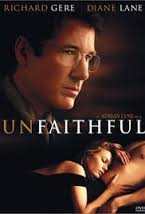
UNFAITHFUL
US, 2002, 124 minutes, Colour.
Diane Lane, Richard Gere, Olivier Martinez, Chad Lowe, Kate Burton, Margaret Colin, Erik Per Sullivan
Directed by Adrian Lyne.
The wind blows through a beautiful Westchester County home outside of New York City. Constance Sumner (Diane Lane), her husband Edward (Richard Gere), and 11-year old son Charlie (Erik Per Sullivan) are content as they go about their daily lives. As Edward leaves for work, Constance tells him she is going to the city later to arrange for a charity auction and to buy a birthday present for Charlie.
The wind blows stronger in the city, and Constance cannot get an empty cab to take her to the train. She falls into a young man carrying an armload of books while waving frantically for a taxi. He invites her to his apartment to dress her wound. An empty taxi approaches, but she chooses to go upstairs with Paul (Olivier Martinez).
Constance finds excuses to return to the city and visit the much younger man. They begin a passionate affair. Constance keeps saying she must stop, but she chooses to continue again and again. One day, two of Constance’s friends, Tracy and Sally, see her near Paul’s apartment. She lies about what she is doing there. They go for coffee and during the conversation, Tracy says that adultery is wrong; it always ends badly—for everyone.
Another day, Constance and Paul are at the café and Bill (Chad Lowe), who works for Edward, sees them together, kissing and laughing. When Edward fires Bill for disloyalty to the company that has been like a family to him, Bill yells back at him to look to his own family. Edward’s gradually growing suspicions are confirmed. He hires a private detective who takes photos of Constance and Paul together.
Edward goes to visit Paul and, in his sorrow and rage, kills him and dumps his body in a landfill. Just before he leaves Paul’s apartment, he checks his phone messages, and Constance has called, breaking off their affair.
Detectives come to question Constance and Edward, but they are evasive. Constance finds the pictures of her and Paul in Edward’s coat and realizes what has happened. Guilt unites them, though Edward talks about turning himself in. Their future is as unclear as a windy, rainy, dark night.
Adrian Lyne has been associated with a number of movies that have explored sexuality, infidelity, and adultery and many of them have been very frank in their depictions of sexual behavior. Some of them posed sexual moral dilemmas: 9 1/2 Weeks, Fatal Attraction, Indecent Proposal, Lolita. With Unfaithful, Lyne has shown greater restraint in portraying sexual scenes and placed greater reliance on the performances and the power of the dialogue to convey the underlying emotions and issues. The movie is all the better for it.
The source for Unfaithful is a French film by a master of suspense and psychological thrillers, Claude Chabrol; it is based on his 1969 film, La Femme Infidele (The Unfaithful Wife). In it, Stephane Audran portrays what the French call a “bourgeois” wife married to an older man, Michel Bouquet. Chabrol spent decades showing the darker side of the French middle-class, using basic moral predicaments like adultery to challenge standards and values in French family and in society.
Because Lyne is so provocative in his film-making, the immediate reaction to Unfaithful was that it was an exploitation piece. However, a careful viewing shows that Lyne is doing for American society at the beginning of the 21st century what Chabrol was doing for his French contemporaries. The ending is especially ambiguous, challenging audiences to think about what they would or would not do in similar circumstances.
An Oscar-nominated performance by Diane Lane as the unfaithful wife helps Lyne. Richard Gere is at his best as the aggrieved husband. Olivier Martinez (Horseman on the Roof, Before Night Falls, S.W.A.T.) plays the lover. Unfaithful is a good example of Hollywood’s ability to present moral issues and dilemmas for an adult audience.
In Unfaithful, Constance repents, but too late to halt the consequences of her behavior.
Unfaithful, as its title suggests, is a straightforward film about adultery. It looks at a marriage which is weaker than either the husband or wife have imagined. It shows the wife hesitating and then committing herself to an adulterous relationship while trying to keep marriage and family together. It also shows the suspicious husband learning the truth as well as the unsuspected violence within him when he confronts his wife's lover.
Connie Sumner in Unfaithful can be considered in the light of the story of the woman taken in the very act of committing adultery in John 8. Her husband has her followed by a detective. When he sees the photos of her with Paul Martel, he confronts her. This is the challenge Edward Sumner faces so that he and Connie can have a future. Can her forgive her? After his own angry and righteous confrontation of Paul Martel—not to speak of his impulsive, unjust killing of Martel and his concealing his crime—must he forgive her?
1. Contemporary setting, suburbs, New York City, homes, lofts, cafes, offices, streets? Score?
2. Domestic scenes, happiness, restrained husband, lively child?
3. Edward at work, hard phone calls, challenge to Bill and firing him?
4. Connie and the encounter with Paul, in his loft? Why the affair?
5. Connie and her friends and the warning about affairs ending badly?
6. Connie’s first encounter with Paul and the taxi; visiting Paul in his apartment, his seductive behavior, her acquiescing and committing herself to the affair; the scene on the train as she returns home, the expressions on her face showing a whole range of emotions and the conflicting feelings that she had experienced; her friend’s warning against adultery?
7. Edward's suspicions of his wife's conduct confirmed by the photos and his visit to Paul; his emotional response to meeting Paul, to seeing and being in the place of the adultery; his growing hurt, anger, and the violent attack resulting in Paul's death?
8. Unfaithful never tells us why Constance makes the choices she does. Her name signifies “constancy,” which means fortitude, fidelity, and loyalty, all of which she denies through her choices and actions. Recall the series of choices she makes (to go into the city even though the weather is bad; to go with Paul rather than take the taxi; to return to his apartment, etc.). What was the state of her conscience? Why do you think she gave into temptation over and over? What made her finally break it off? What about Edward - surprise that he killed Paul? Why or why not? What was the state of his conscience by the end of the film?
9. The final decision for Connie and Edward: the possibility of giving themselves up to the police or the possibility of fleeing to Mexico; their consciences, their concern for their marriage, for their son; sitting at the traffic lights outside the police station and the inconclusive but challenging ending?
10. The film is full of symbols that underpin the theme of the film by showing how the choices a person makes can turn order into chaos. From the opening scenes, we see the laconic setting, the wind, the collection of glass “snow balls” from various cities, the camera, video camera, photographs, the train, water and washing, the dry cleaners, the sore on Constance’s leg. In what ways did these visuals help make meaning from the film?
(Material from Lights, Camera, Faith… The Ten Commandments, Rose Pacatte and Peter Malone)
Published in Movie Reviews
Published in
Movie Reviews
Tagged under
Saturday, 18 September 2021 20:01
Thing Called Love, The
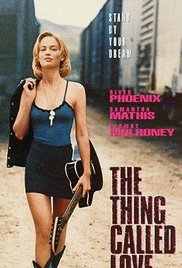
THE THING CALLED LOVE
US, 1993, 116 minutes, Colour.
River Phoenix, Samantha Mathis, Dermot Mulroney, Sandra Bullock, Anthony Clark, K. T. Oslin.
Directed by Peter Bogdanovich.
Peter Bogdanovich has had a mixed career as screenwriter, film journalist, actor and director. In his early days he published articles and books, especially on John Ford. His1968 thriller, Targets, with Boris Karloff, introduced him to the cinema world. For a while he was on top with The Last Picture Show, What’s Up, Doc, Paper Moon. For the next 40 years he continued to make films but with mixed, very mixed, success.
This was his film of the 1990s, the story about Nashville and would-be singers, the heroine coming from New York City to succeed, going to the Bluebird cafe where there were weekly auditions and performances, finding local singers. She is played by Samantha Mathis who does not immediately have success with her singing, works on the staff of the Bluebird cafe, falls in love with a moody composer-singer, one of the last roles for River Phoenix, is admired by his friend played by Dermot Mulroney and becomes a friend with another would-be singer, played with great verve by Sandra Bullock just before she became popular.
The film will be more popular with younger audiences who might be able to identify with the characters and their dreams and hopes. Older audiences may find the characters and their behaviour somewhat trying.
However, it is a picture of Nashville, a picture of the young hopefuls who continue to audition, to compose, to sing, sometimes failing, often times having success.
1. The title? Songs, music, Nashville, romance?
2. The young cast and their working together? The director and his career?
3. The city of Nashville, the look, the streets, the cafes and clubs? The music of the city? The auditions, ordinary life, young people? Hopes, ambitions, success and failure?
4. Country music, compositions, melodies, lyrics, from the heart – and entertainment pieces?
5. The Bluebird Cafe, the goal for the young people, lining up for the auditions, Lucy in charge, not being late, the performances, and notes, writing No, the list of people who could sing on Saturday? Her background, her role, the running of the restaurant, the staff? The performances? Her liking the young people, different relationships with them? Her liking Miranda but not giving her a chance? Her liking Jimmy and his success? Kyle, eventual success? Linda Lou and not succeeding? Miranda and the decision to go back to New York, her return, Lucy supporting her, the song, allowing her to sing on Saturday, and putting the song on the wall as a classic?
6. Miranda’s story, farewelling New York, hopes, the trip, arrival, the taxi, arriving late, Jimmy lying and including her in the lie? Her reaction to him? Her performance on return to audition? Not succeeding? Asking Lucy for feedback? Being offered the job as a waitress? Her work, listening to the singing, the customers? The friendship with Linda Lou, sharing the motel apartment with her, going to the cafe to write the music? The interactions with Jimmy, clashes, beginning to like him, the separation? The return? Falling in love? Confiding in Linda Lou but leaving? Kyle and his liking of Miranda? Wanting to work with Jimmy, the ride to Memphis, in the store, the proposal with the ring, getting the pastor, worrying whether it was the right thing, the wedding? The return, Linda Lou being happy, Kyle and the difficulties, talking with Jimmy? The possibility of the marriage succeeding, their moving into a house, Jimmy secluding himself to write, Miranda sleeping during the day? Jimmy and the offer to go to Dallas, leaving Miranda behind, her tearing up the paper and divorcing him? Her managing, deciding to go home, the farewell, on the bus, the inspiration, in the cafe and writing, the return, her personal song, Jimmy present, singing it? Success? Joining with Kyle and Jimmy in the truck? The future?
7. Jimmy, his story, quiet and sullen, composer, being late, lying and incorporating Miranda? Being successful? Writing, clashes with Miranda, the gradual change? Her wanting to write with him? The separation, then the trip to Memphis, proposal with the ring, returning, staying three days in his room composing, the offer from Dallas, his going, success with the entrepreneur, his decision to return, Miranda’s return, hearing her sing, the resolution of the difficulties?
8. Kyle, friend with Jimmy, his compositions, eventually succeeding, love for Miranda, but in the background? With the group, with Linda Lou? The clashes with Jimmy? Concern about Miranda, her leaving? Return? The fight with Jimmy and Lucy sending them outside? A final reconciliation?
9. Linda Lou, genial, friendly with the group, friendship with Billy, music, his being slow, accompanying her? Friendship with Miranda, sharing? Her mother and lying to her about success? Friend, reconciliation, going off happily at the end?
10. A film for young people, about young people – and in the context of Nashville and succeeding in writing and singing country music?
Published in Movie Reviews
Published in
Movie Reviews
Tagged under
Saturday, 18 September 2021 20:01
Marina
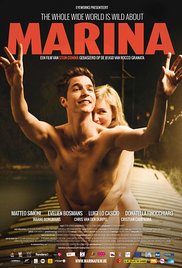
MARINA
Belgium, 2013, 113 minutes, Colour.
Luigi Lo Cascio, Donatella Finocchiari, Matteo Simoni, Evelien Bosmans, Flor Decleir.
Directed by Stijn Coninx.
Amongst the films by Belgian director Stijn Coninx are his portrait of a social-minded priest in the 1890s, Daens, and a serious look at the singer who was best known as Soeur Sourire/ Sister Smile with her song in the 1960s, Dominique. He has gone back into Belgium’s past with this story of Rocco Granata, a young accordion player, a singer who achieved international fame – and his keynote song, Marina.
The film offers a picture of Flemish society after World War II, the coal mines of the Limburg region and the importation of Italian workers for the mines. Salvatore Granata is one of a group of miners in 1948 who go to Belgium for a couple of years, leaving wives alone, caring for their children. However, Granata sends for his family and they are able to migrate – difficult in terms of language for the mother, easier for the children who, though seen as foreigners, begin to learn the language and become Belgians.
The father is strict, not wanting his son to become a miner but have his own forge. However, he is talented with the accordion and likes to sing, eventually winning the competition and some money, to the upset of his father. With tension in the household, Rocco tries to please his father. The father has an accident in the mine, gets limited financial compensation. It seems that the family will have to move out of its home. Rocco sells his accordion to get some money for rent.
He and his friends play in a local club and produce a record though the producer says it will have no life. On the contrary, it becomes popular, even being sold by the grocer who has been hostile to the family and not allowing his daughter to mix with the Italians. The daughter has always been attracted to Rocco and there is an incident on a bridge where Rocco saves the girl who is later raped by her boyfriend.
The end of the film has Rocco in Carnegie Hall, his performance in 1958 being broadcast and his father, eventually proud, takes the radio out of the house into the street so that everybody can listen to his son.
Actor Matteo Simoni portrays Rocco, being a Belgian of Italian origin.
1. An international story? European story? Italy? Belgium?
2. Post-war Italy? The devastation? Work, poverty, the mines, forges, the times, migration? Belgium and the mines and the needs? The workers, travel, accommodation? Prejudices for and against? The parent generation? The younger generation?
3. The period, the look, costumes and decor, in Italy, Italians and their traditions, food, patriarchal, language? The contrast with Belgium, orderly, homes, the mines, working conditions, shops, language?
4. The title, the popularity of the song, Rocco’s story and life, the hard life, his success, career? From Italy to Belgium to international star?
5. The range of the songs, the musical score? Performance? Piano accordions? Bands? Recordings?
6. Italy, 1948, the family, the father and his work in the mine, the decision to go to Belgium, the prospect of many years? The wives, at home, alone, the children? Hardships? The mentality?
7. Belgium as a foreign country, the mines, the work, the bosses, accommodation, hard, cash, the letters home? The father offering hope and the family migrating?
8. The sense of migration, the father, subservient, obedient, continuing his work, his expectations? His wife and obeying, homesick? The son and daughter, at home in Belgium, yet feeling foreign, at school, learning the language? Beginning to belong?
9. Rocco’s story, as a young boy, in Italy, devotion to his father? In Belgium, active, his music, playing the accordion? The encounters with Jackie? His friends? The shop, Helene? His mother and thrift? His mother’s later visited the shop, buying the chicory? The father, the company? His anger at his son, wanting him to have a forge, not a musician? The issue of the accordion, buying it, Rocco’s performance and the accordion left in the rain? The father’s response to Rocco’s success, going to the club, the competition, his walking out, his anger? Rocco and his talent, the competition, winning, trying to please his father? His reaction to the accordion out in the rain?
10. Helene, as a girl, the father, the shop, his bigotry, her growing up, attractive, meeting Rocco, the bond between them, going to the clubs to listen to him? Rocco’s mother the shop, the chicory, the language? His forbidding Helene to meet with Rocco?
11. The meetings, the club, Helene going to study, her boyfriend, going to the club, his angrily walking out? On the bridge – and Rocco seeing her, the possibility of her jumping? The couple on the bridge, the sexual encounter? The aftermath? The boyfriend and the rape, the effect on Helene?
12. The father, his accident, the issue of money, the rent, insurance, compensation, having to move out of the house? Rocco selling his accordion, giving the money to his mother? The heartlessness of the local bosses?
13. The role of Jackie, slow, in the background, friendship with Rocco, the encounters? At the club? his observing? going to the police, the witness to the rape?
14. Rocco, the entrepreneur, the recording and the excitement, not being able to sell it, the distribution town, the grocer and his selling copies, the other sales? Rocco becoming a success?
15. The aftermath, playing Carnegie Hall, the long dedication of the performance to his father? The family listening to it in the kitchen? His father taking the radio out so that everybody could hear?
16. A pleasing biography of a Belgian celebrity?
Published in Movie Reviews
Published in
Movie Reviews
Tagged under
Saturday, 18 September 2021 20:01
Angel for May, An
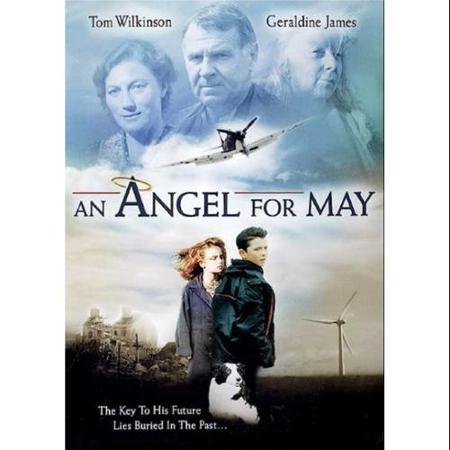
AN ANGEL FOR MAY
UK, 2002, 97 minutes, Colour.
Tom Wilkinson, Geraldine James, Matthew Beard, Charlotte Wakefield, Anna Massey, Angelina Ball, Dora Bryan.
Directed by Harvey Cokeliss.
Some audiences may not respond well to the fact of having angel in the title. There is more than a touch of sentiment, as there is in this film, and some moments which are rather twee.
While some of the sequences are set in Yorkshire in World War II, the 1940s, the rest of the film is set half a century later in the same village. The film also involves time travel so that the young hero of the film, Tom, Matthew Beard, is somewhat cantankerous with his separated mother, not wanting her to marry her boyfriend, with his moods, but is also much more genial when he finds himself in the middle of raids in the 1940s.
Most of the interesting action takes place in the past, Tom finding his self at a farm, managed by Tom Wilkinson, preparing to marry his housekeeper, Geraldine James, but encountering a young girl, May, Charlotte Wakefield, who has been rescued from bombed buildings. Tom and May become friends, roam the countryside and experience German planes flying over and bombs falling, go into the town where they are pursued by the police, especially after Tom takes clothes from a clothesline hoping to disguise himself and get back home.
He has been absent for three days and nobody believes his story about going back into the past. He meets an old bag lady, played by Anna Massey, who seems connected to the past. He discovers that the housekeeper is still alive in a nursing home and goes to visit her, hearing the story of May, the bomb on the farm. His effort is to go back to the past and to save May – which he does, not in the way expected.
At the cemetery in the present, he discovers gravestones – and an older woman, again played by Anna Massey, coming to visit the grave of her friend who had survived the bombing, as had she. She had moved to live in the United States.
With the focus on the children, this is a film which can be helpful to younger audiences as well as to family audiences.
1. A pleasing film for children, family, adults? Realism and fantasy?
2. The contemporary setting, a Yorkshire town, home, school, countryside? The comparison with the 1940s Yorkshire setting, the countryside, the farm, the town, the bombing raids, the destruction, the streets? The musical score?
3. The title, the folks on May, the role of Tom as an angel for her?
4. The prologue, the war, the bombardments, the damage, the Army nurse, hearing the sounds, the rats, uncovering May and rescuing her?
5. The present, Tom, his age, his relationship with his mother, his father absent, preparations for the divorce? His surliness with his mother? His reaction to Bob? Opposing the marriage, moodiness? Running out of the house, seeing the dog, taking shelter, the chimney?
6. Transported into the 1940s, the farm, Sam wondering who he was, the encounter with may, Sam’s daughter, with Susan? His being bewildered?
7. The experience of the 1940s, the damage, his taking the clothes from the clothesline of being pursued, may rescuing him and tripping the policeman? Back at the farm, becoming friends, sharing the meal? The ham?
8. May’s story, to be taken away, wildness and fear, Tom calming her down, her eating properly, at ease with the family? In the country, the success of bombs and diving into the pit? The dress, going away, the fears that she would not return, the return and everybody happy?
9. Tom, wanting to leave, Sam’s farewell, with Tess the dog?
10. Back home, everybody searching for him, missing three days, his mother’s anxiety, Bob and offering confidentiality? The police? People not believing him? The counsellor and CE had an imagination? Going back to school, the jibes from the other children?
11. Confrontation with his mother, wanting to go out, her locking the door? His asking her to trust him? His not being worried about the marriage even though his mother and Bob were prepared to sacrifice?
12. Finding that Susan was in the old people’s home, his visit, her memories, giving the information about the bomb?
13. Going back, the encounter with Rosie, the vagrant woman, recognition, that she was May?
14. His return, finding Sam did as he had seen the headstone in the cemetery? Going to the town, finding May? Trying to persuade her to come with him? The lightning? Who wanting to see her friend, going to the hospital, using his inhaler – which the boys on his previous visit had broken? Thinking it was a German bomb and he was a spy?
15. His return, going to the cemetery, encountering may, May, living in the US, her husband, her memories? Her friend living on? His return and the scenario changing?
16. With his mother, with Bob, happy future?
Published in Movie Reviews
Published in
Movie Reviews
Tagged under
Saturday, 18 September 2021 20:01
Gitan, Le/ The Gypsy
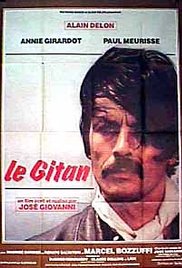
LE GITAN/ GYPSY
France, 1975, 102 minutes, Colour.
Alain Delon, Paul Meurisse, Annie Girardot, Renato Salvatori, Bernard Girardeau.
Directed by José Giovanni.
Alain Delon was a significant figure in French Cinema during the 1970s and into the 1980s. He also appeared in the number of Italian films as well as a number of American films. With his good looks and his screen manner, he could appear as hero or villain or as a mixture of both. he was to be the star of some significant crime films by director Jean- Pierre Melville.
This film comes in the middle of this period, perhaps a minor contribution to the crime genre, but interesting in its focus on the world of the Gypsies.
There is quite an opening shot, helicopter view of people on holidays enjoying swimming in the sea, the helicopter then tracking over the people on the beach itself, sunbaking, continuing over the seaside town, homes and factories until finally landing on the site of the Gypsy camp at the edge of the town. The film is making a stand on prejudice against Gypsy communities, presumptions that they are involved in crime (and often they were as here) and their continually being moved on.
Parallel to this introduction to the Gypsies is a scene where a veteran safe cracker is at work, finding a haul of jewellery, going home to find that his wife is on the phone, in fact having an affair with a policeman, where he whips her and she confronts him by sitting on the edge of the balcony and then falling to her death.
The film shows the police, under the lead of veteran actor Marcel Bozuffi (The French Connection), pursuing the safe cracker as well as Hugo, the Gypsy criminal, played by Delon. By chance, the paths of the two intersect bringing complications in the police pursuit.
The film is of interest and takes its place among the Delon thrillers of the 1970s.
1. French crime thriller, police thriller of the 1970s?
2. The presence of Alain Delon, his influence on French Cinema, on crime films?
3. The contemporary setting, the long opening sequence, overview, the beach, people enjoying swimming, sunbaking, the helicopter continuing over the town, the change of atmosphere, the factories, finally coming to the gypsy camp?
4. The title, the focus on Gypsies and their status in Europe, in France, the 1970s? Antagonism? The role of the police, suspicions and prejudices, thieves, criminals, moving them on? The film as a stand for Gypsies?
5. The French atmosphere, the town, the camp, apartment blocks, police precincts, provincial towns, the coast, the beaches, the clubs, hotels? The musical score?
6. The focus on Hugo, and Alain Delon character, his appearance, in hiding from the police, concealed by his father, his playfulness with the young boy, relationships with the women? His associates, his reliance on them, advice? The robberies and the daring in daylight, his not being disguised? Robbing the truck? The background of being in prison, the prisoner who supported the police, tracking him down, confronting him, shooting him by the water? The further robberies? Discussions with his friends, clashes? His reliance on them? In the town, the criminal brothers, reporting to the police where he was, his tracking them down, the glass of water, confronting them, shooting?
7. The focus on Yan, his age, criminal background, prison? The safe, the police associates? The robbery? Taking the brooch? Coming back to his wife, on the phone, her affair, his whipping her, certifying him, sitting on the ledge, her falling? The police blaming him for her death? His associates, selling the jewels, his lawyers and their advice? His leaving the town, lying low, holiday? The chance encounter with Hugo? At the restaurant, his friendship and interactions with Ninie? The interview with the police chief? His shielding the gypsy for the night? Giving him the car keys? Confronting the policeman who had the affair with his wife? Portrait of the criminal?
8. The police chief, the meetings with his staff, surveillance, interactions with the officer who had the affair with the safe-cracker’s wife? Communications, photos? His attitude towards Hugo? On-the-job, tracking down the safe-cracker for the murder, but more for the robbery? Tracking down the Gypsy? The raids? The confrontation in the apartment corridor, Hugo getting the gun, getting the keys of the car, letting the policeman go? The continued pursuit? The personalities of the police, especially the man who had the affair?
9. Hugo and his friends, their being shot, taken to hospital, Hugo and his own wound, approaching the vet, the gun, offering him money, the vet warning him about being arrested, having the honour not to take the money?
10. The return, giving the money to the other Gypsies?
11. Yan, with Ninie, kept by the police for a fortnight, not entering his name in the book? Giving her the money?
12. The film in the style of French crime dramas of the period?
Published in Movie Reviews
Published in
Movie Reviews
Tagged under
Saturday, 18 September 2021 20:01
How to win at checkers, every time
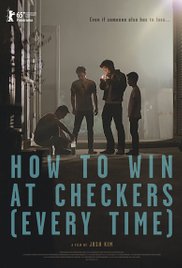
HOW TO WIN AT CHECKERS (EVERY TIME)
Thailand, 2015, 80 minutes, Colour.
Directed by Josh Kim.
This film was Thailand’s nominee for consideration for the 2015 Academy Awards, Foreign Language films.
This is a brief film about the Thai countryside with excursions into the city of Bangkok. It is designed as a memoir, an 11-year-old called Oat, looking back on his life and, especially on his brother.
The two boys have lost their parents and are being looked after by an aunt who also has a child. Living is not easy, money not always available. The aunt has some hope when the older boy has to go to the military draft. If he receives a red card, he will go into the armed forces and be able to draw a salary which he can send home.
There is a focus on the older brother who is in a gay relationship with a wealthy friend, the film taking for granted, without specific comment, gay relationships. The wealthy man, however, escapes the draft because his father has bought off the authorities, something which dismays the brother.
The film is built up by scenes in village life, the relationship between the two gay young men, life for the 11-year-old – rather complicated after the draft by the young boy riding on his brother’s motorbike, his brother teaching him to ride, but going into a club in the city where the older boy is a call boy.
There is some pathos at the end, the fate of the young man in his military service – and the rueful looking back by the older Oat.
1. Thailand’s Oscar nominee for 2015?
2. Thai, the feel of Thailand and its people?
3. The locations, the town, Bangkok city, homes, clubs, streets? The musical score?
4. Title, with reference to Oat, finding the book, playing checkers with his brother, losing, learning from the book, special technique and defeating his brother?
5. The story from Oat’s perspective, as an adult, his voice over, memories and his comment on what had happened to him? His parents, his father and the bike, their deaths? His bond with his brother, at home, the aunt looking after them, their cousin? At school, friends? The meetings with Kitty, her saving him from Junior at the drug scene? Friendship with Jai, matter-of-fact about Ek’s relationship with Jai, concerned about the draft, about finance for looking after them if Ek were to go to the Army? Stealing the money and the bottle of whiskey? Attempting to bribe the boss? His angry reaction, ticking off Oat and Ek? Ek’s principles? Dressing properly for the draft, Oat present at the draft, the aftermath, allowed to ride the bike, going to going to the sex club, smoking cigarettes, seeing Ek with his client?
6. Ek, ordinary young man, the prospect of the draft, his relationship with Jai, their bonds, the scenes together, the issue of the bribe about the draft, Ek not believing in bribes, disgust at Jai, getting dressed for the draft, his aunt’s concern, getting the red card, assigned to the Army? Getting money as a call boy? Teaching Oat to ride on the bike, the ride and its exhilaration – the first and the last? His being appointed to the south, the patrol, on the bike, being killed? The tribute of the funeral?
7. Jai, age, wealthy background, relationship with Ek, outings, his father bribing to get him out of the draft?
8. Kitty, transgender, the hormones, her friendship, at the club, helping Oat?
9. The aunt, running the household, lack of money, gift of grilled chicken, her concern about and his salary and caring for the children?
10. The opening, the intimations of the draft, the young men being measured? The draft itself? The National anthem? The box, each of the
candidates drawing his card?
11. The image of Ek fire? In dreams? His shaking the drugs and the fear of explosion?
12. The boss, Junior, thugs and drugs?
13. A story of contemporary Thailand?
Published in Movie Reviews
Published in
Movie Reviews
Tagged under
Saturday, 18 September 2021 20:01
Green Room
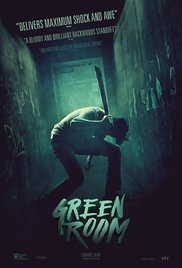
GREEN ROOM
US, 2015, 95 minutes, Colour.
Anton Yeltchin, Imogen Poots, Patrick Stewart, Alia Shawkat, Macon Blair.
Directed by Jeremy Saulnier.
The green room is generally where performers wait before they go on stage, before they go on the television set, a place for a drink, conversation and relaxation. Definitely not so here.
A great deal of the film takes place in a shabby club in rural Oregon where the green room is anything but. It becomes the setting for violent action, young people being locked in, violently threatened, challenged as to how they will get out – and the green room has very little green, rather dingy colours with dominant dark and light grey.
But, who are these young people? They are members of a punk rock group looking for gigs around the US West Coast, singing their punk rock songs, dressed in grungy style, and their looks, hair, accordingly. In fact, the writer-director, Jeremy Saulnier, grew up with punk rock, was a member of bands, and is paying something of a tribute to his upbringing and his tastes in portraying this group – led by actor Anton Yelchin, with Alia Shawkat as manager.
After a less than successful episode with minimal pay, they are recommended to go to Oregon where they can perform and be better paid. Mistake. Big mistake.
Out in the Oregon woods, this club is a venue for neo-Nazis, the men looking as if they belong to extreme bikie clubs, tough women in attendance, listening to the music, some seemingly in revolt against the music, but the players managing to survive and be on their way except that they have to go into the green room to pick up a mobile phone – where there has been a murder.
Not only are the members of the group trapped in the green room, they try to negotiate their way out, are reassured that the police are coming – but gradually, they experience the menace of the neo-Nazi leader, an ageing skinhead who organises meetings for American rights, and played with ugly menace by Patrick Stewart.
Also in the room is one of the local girls, played by Imogen Poots, who also wants to get out.
Long ago Agatha Christie wrote one of her novels with the characters being picked off one by one, a basic plot device used by many stories, And There Were None… Well, if not quite none, then possibly two if there is a romantic vein in the plot.
And so, the musicians try to find ways of getting out of the room, out of the basement they discover, out of the building, but gradually meet their fate. The main player explains, twice, a paintball contest where the amateurs defeated the professional, so…
The group would never have envisaged this kind of catastrophe after their performance and have to work out their fears, the desire to live, their ability to help one another – until a final confrontation in the woods where justice is seen to be done.
This is a thriller with menace and horror touches – macabre would be the word - the make-up artists with a great penchant for cuts and slashes. Jeremy Saulnier’s previous film, Blue Ruin, also explored themes of violence.
1. A thriller? Horror film? Social comment?
2. The director, his career, his mentality – and horror thrillers?
3. The settings on America’s West Coast, the opening in the cornfield, the gig in San Francisco, moving to Oregon, the woods, the venue for the concert?
4. The interiors of the club, the green room, enclosed, the performance space, the drug lab?
5. The music, rock, punk? Throughout the film? The jokes about what each would take if stranded on a desert island?
6. Group waking, their personalities, in the cornfield, no petrol, siphoning off some, on the troubles, then music, instruments, the singer, the musicians, the manager? Going for the performance, the organiser, the small response, the poor pay? His promise for something to happen in Oregon?
7. The going to Oregon, being warned to keep quiet about the neo-Nazis? The contact with Daniel? Club, the audience, rough, skinheads, neo-Nazis? The personnel at the club? Gabe and his welcome? Reactions to the performance, the pay, about to leave, going to find the phone?
Seeing the dead woman by chance? The new situation?
8. Trapped in the room, the one exit? The dead girl, stabbed, removing the weapon and the blood flowing? Emily and her fear? Justin, tall, dominating? The promises that they should stay and the police called? The stain, locked in, dominated by Justin, the terror?
9. Darcy, Patrick Stewart, his arrival, the leader of the group, his aetiology, neo-Nazi, white rights, the drugs? Gabe and his management? The other members of the team? Reaction to the death, the decision to stage an accident with the deaths taking place there, no key for the vehicle? Is setting a siege to the people in the room, discussions, bargaining, to throw out the gun, the slashing of Pat’s hand? Overcoming Justin, his death? Darcy and his orders?
10. The characters of the group, the singer, nerves, the strong musician and his being able to strangle Justin? Sam and her leadership, fair he is? Management?
11. Trying to get out, the floorboards, down into the drug lab? The been trapped? No exit?
12. Darcy setting the thugs against the group, the guns, the dogs, using the microphones for sonic effect on the dogs? The shootings, the slashing is? The team being killed?
13. San, Emily and Pat? The further attempt, Emily getting outside, her death? The thugs waiting?
14. Pat, his talking about the paintball competition, the professionals, no chance – later taking up the story, explaining it to Emily, the last man and his dash?
15. Daniel, going in, the revelation of his relationship with the dead girl, Darcy looking in the boot of the car and finding they were going to leave? Daniel going in, helping, his being shot?
16. The group with the number of bullets, the knives and weapons? The confrontation, killing those within the club? Getting out, the encounter with Gabe, gunpoint, the walk into the woods?
17. Coming to the scene of the staged accident, the guns, the dog, the shootings and Darcy’s death?
18. The two surviving? The dog coming to be with its dead master? Gabe and finding the workers and calling the police?
19. A macabre film, with credible enough characters, the fight for survival – the deadpan joke at the end?
Published in Movie Reviews
Published in
Movie Reviews
Tagged under